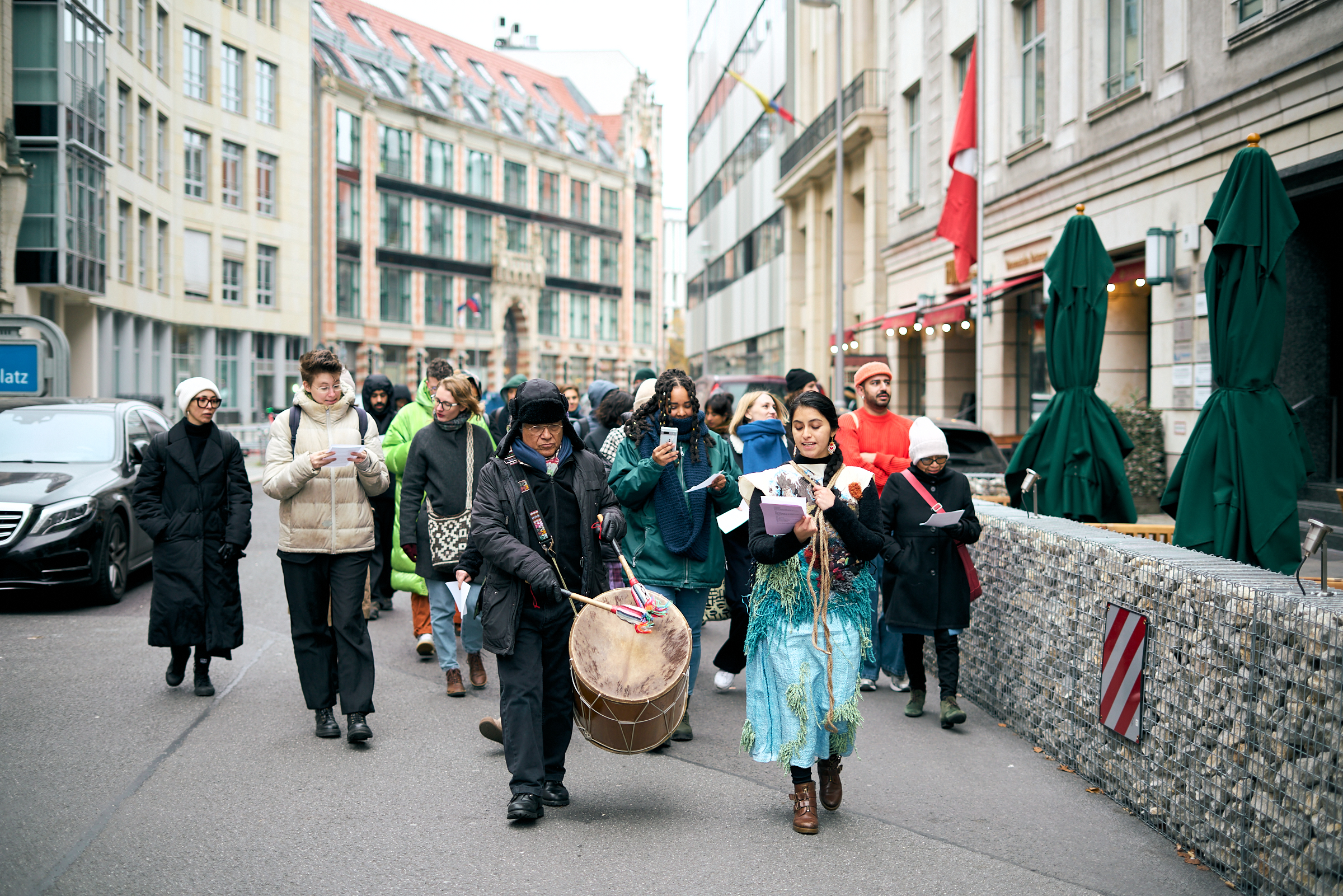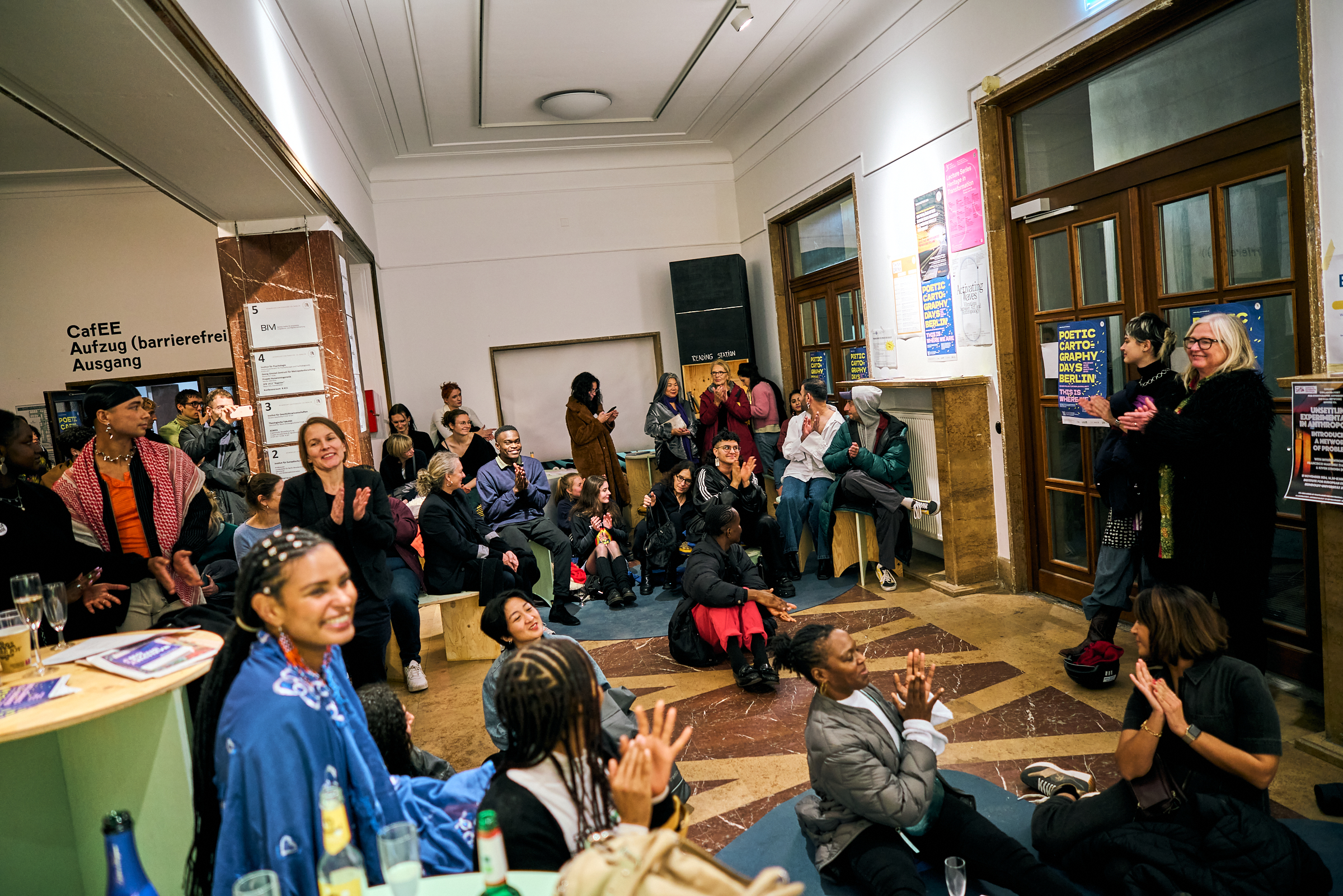POETIC CARTOGRAPHY FESTIVAL
Counter Mapping Project
Fragment from the (forthcoming) paper: Traces of Counter-Mapping: Rethinking Berlin after the Berlin Conference by Garland, M., Maier, J. C., Lyonga, Hn., Person, N.(2025)
︎ More infromation about Counter Mapping project visit HERE
Tracing Beyond Borders
By Melanie GarlandOn November 15th 2025, we opened the three days of the Festival Poetic Cartography Berlin in the Amo Salon* together with the curator, poet and dear friend hn. lyonga with a joint recitation of our poem ‘This Is Where We Are’. This poem served as a poetic manifesto, reflecting our festival’s curatorial questions: Who We Are, Where We Come From, and Where We Are going. Rooted in our narratives as people from the Global South, the poem embodied traces of counter-narratives —aspirations and histories interwoven with post-migrant European landscapes.

November 16th 2025, 2nd day of the festival, performance The song to the melting of the ice
by artist Daniela Zambrano, photo by Pablo Hassmann
by artist Daniela Zambrano, photo by Pablo Hassmann
In curating the Berlin Poetic Cartography Festival, we explored the possibility of counter-cartographies through poetry, allowing us to reconnect with the notion of “trace.” The “trace,” as Jacques Derrida remarks, is not merely a remainder of thepast but a sign of absence—an interruption that challenges linear interpretations of time and history (Derrida, 1967). In this context, the trace is both a mark toward the past and a force for reimagining the future. Poetic counter-cartography amplifies this notion of trace, subverting dominant narratives to reveal the silenced and erased histories of colonized and marginalized communities. As an artistic method of resistance, poetic counter-cartography transforms the idea of the map from an authoritarian tool into a collaborative process. It reclaims personal and collective histories, allowing narratives to emerge in a fluid and interconnected polyphonic mode that counters the forms of separation and division that shape our world today.
Tracing Collective Geographies
through poetry
Our curatorial process, as well our migratory journeys, has been deeply shaped by traces. Traces that reflect the places we have called home, the relationships that have defined us, the cultural intersections that inform our polifon-identities, and the enduring colonial imprints in our ancestral histories. These traces do not exist as static memories but as dynamic narratives, shaping how we navigate and interpretour worlds. Poetic-counter-cartography, in this sense, is an embodied practice—one that acknowledges the impermanence of memory while celebrating its transformative potential.
![]()
November 15th 2025, 1st day of the festival, photo by Pablo Hassmann
For the Poetic Cartography Festival, we invited ten poets and artists whose work honors their cultural traces while critically engaging with the colonial legacies that persist in their collective contemporary identities. For instance, the autobiographical poetry of Afro-German Savannah Sipho reflects the intricacies of Afro-descendant people in European cultures. Similarly, Daniela Zambrano brings the ice rituals from South American Andean epistemologies, reimagining the high-altitude ice traditions of Quechua peoples. Rami Shalati’s modular textile installations weave together traces of Arabic migration, creating counter-narratives of identity through fabric interpretation.Through these poets and artists, we sought to amplify multi-voices that challenge Western-centric approaches to mapping. By re-centering diasporic perspectives in the heart of Berlin-Mitte, the festival created a counter-narrative that critically engaged with colonial structures. It foregrounded transcultural and multivocal perspectives, illustrating how diasporic and post-migrant communities are pivotal to decolonial thought.
Throughout this curatorial process, poetry emerged as a tool for counter-narrative. It invites openness to our surroundings, cultivating spaces of connection and transformation. As a counter-narrative, poetry has the power to reshape dominant and fixed spaces into spaces of caring solidarity through emotions, feelings, and community. In this way, thanks to poets, artists, and the public, we succeeded increating a space where poetry serves as a force to break dominant spatial barriers. By amplifying voices normally excluded from historical narratives, we collaboratively created a space of care, solidarity, and neighboring. This festival shows us that tracing excluded histories is not just an act of remembering but a collaborative practice of co-creation—a way of reimagining futures rooted in shared histories. In the interplay between trace and becoming, poetic-counter-cartographies offer a path to building more inclusive spaces, forging connections that transcend borders, time, and place.

November 16th 2025, 2nd day of the festival, performance The song to the melting of the ice
by artist Daniela Zambrano, photo by Pablo Hassmann
*The Amo Salon is a publicly accessible space in the center of Berlin that brings together artists, researchers, and members of the civil society to reflect on the city’s colonial past, its impact in the present, and implications for the future. Located at Institut für Europäische Ethnologie Anton-Wilhelm-Amo-Straße 40/41 (formerly M-Straße) 10117 Berlin.
by artist Daniela Zambrano, photo by Pablo Hassmann
*The Amo Salon is a publicly accessible space in the center of Berlin that brings together artists, researchers, and members of the civil society to reflect on the city’s colonial past, its impact in the present, and implications for the future. Located at Institut für Europäische Ethnologie Anton-Wilhelm-Amo-Straße 40/41 (formerly M-Straße) 10117 Berlin.
